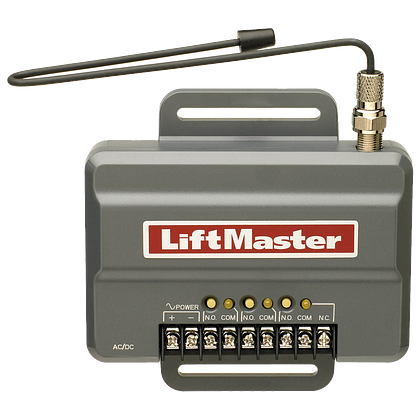Frequency interference occurs when an electromagnetic signal disrupts communication between the garage door opener and remote devices, preventing the door from opening or closing. The interference can manifest through numerous symptoms:
- Garage door opener remote and keypad only work sometimes or not at all.
- Garage door works only during specific hours.
- Garage door opener suddenly loses range.
- Garage door only works up close or from a close range.
- Garage door not opening or closing with the remote, keypad, and car.
- Garage door not working from outside the garage.
- Garage door only opening but not closing with the remote, keypad, and car, or vice versa.
Garage door remote controls, keypads, and cars should be able to open and close your garage door properly when approximately 50 feet away from the garage door opener’s receiver, typically around 2-3 car lengths. Signal issues with the remote devices or problems with the range, may indicate that there’s a Radio Frequency Interference problem. The interference could originate from various sources:
- Electric Appliances: garage door openers, LED light bulbs, sprinkler systems, microwave, refrigerators, Wi-Fi routers, wireless devices, video cameras, nearby amateur transmitters, citizens band transmitters, police transmitters, military transmitters, broadcast towers and TV transmitters, and any electric device with a circuit board.
- Natural Phenomena: lightning storms, tornadoes, hurricanes, static electricity, radiation from the sun, solar storms, and other natural electromagnetic activities can temporarily disrupt the garage door opener signal.
- Unlawful Frequency Jamming Devices: frequency or signal blocker, GPS signal jammer, and cell phone jammer.
Interference with the garage door frequency is not uncommon. Previous incidents, such as the Rancho garage doors mystery, the Ohio garage door blackout, and the ELMR update, have raised awareness of the problem.
How to Fix Garage Door Frequency Interference
Start by removing nearby LED lights and testing the remotes. If the interference persists, proceed by unplugging all electrical devices inside the garage. Then, systematically plug each one back in, testing the range of the garage door opener after each addition to identify any device that might be causing interference.
If the interference problem persists, turn off the circuit breakers to all of your home except the garage. Test the range of the opener’s remote. If it improves considerably, something in your house is causing interference.
Restore power to each room, one at a time, and test the remote control’s range after each one. Identify the room with the problematic device, unplug one device at a time, and test the remote control’s range in the garage. Eventually, unplugging a specific device should improve the range.
Before you start, keep in mind that troubleshooting and identifying the source of interference can be challenging. External sources of interference, like nearby broadcast towers, military transmitters, and industrial equipment, may be beyond your control. Additionally, a component inside the garage door opener, such as the transformer or circuit board, may also be a cause for interference.
Metal objects like support beams or headers in buildings can cause physical interference as signals find it more difficult to pass through; they can bounce off or be absorbed by these surfaces. If your garage door opener is located in a metal-constructed building, try installing an antenna extension to help signals penetrate the structure.
If you can’t identify and eliminate the interference source, you might need to change the frequency of your garage door opener by replacing the opener or retrofitting a receiver with a different frequency. Contact a licensed garage door repair company and provide them with your opener’s model number to find out what frequency it uses.

If your garage door opener still experiences interference issues after switching to 315MHz or 390MHz frequencies, the only solution is to use a smart garage door opener controlled by smart devices. Wi-Fi networks operate on higher frequencies, such as 2.4 GHz and 5 GHz, which are less susceptible to common interference.
How to Prevent Interference Problems from Occurring
You can help prevent appliances and electric devices from emitting unwanted noise and interfering with your electric garage door frequency by using surge protectors, grounding per manufacturer’s guidelines, and making sure that electrical wires are properly insulated.









Our garage door started working intermittently when we purchased a new 2020 Acura RDX.
Do you believe that the new car technology could interfere with an older model garage door opener?
Hello J., thanks for reaching out.
It is possible. You can test it by parking your vehicle away from the garage and see if frequency interference continues to occur. To solve frequency interference issue with older garage door openers, please visit this post about the subject.
Thanks guys for the article !
We just had this happen in our neighborhood— a block of residences lost ability to open doors with remotes. They only worked if you stood 3 feet close to the opener, or if you used the opener hardwired to the wall.
Turns out the recent LEDs installed were interfering with the signal. The openers were from 2007 and had Security+ on them, but not sure if Security + 2.0.
Once we removed the bulbs, the openers worked again.
I have 2 garage door openers in my garage which will spontaneously open the doors at any time. Seems to happen only when both openers are connected. I have removed LED bulbs but that has not resolved the matter. Any ideas?
Hello RB, if your garage doors spontaneously open, it’s likely not a frequency interference issue but one of the following:
1. The opener’s signals mixed up with one of your neighbors.
2. The wall button or its wire is defective.
3. A component inside the electric door opener is causing a short.
4. Defective remote controls that operate the door accidentally.
The first step to fix a garage door that opens spontaneously is to reset the opener’s signals. Please see My Neighbor’s Remote Opens My Garage Door
Thanks for your quick and complete response! I do very much appreciate it. In my case, options 1 & 2 are not relevant because I have reprogramed the controls twice, when there was no traffic on our little street and we have no wall buttons.
As for option 3, which components should be examined/replaced?
In option 4 we have 2 original controls which I have interchaged already to see if the problem shifts from the door that originally presented the problem to the other – now both open spontaneously! We also have the controls programmed into 3 car’s HomeLink systems – could those be causing the problem and how do I determine which control is causing the problem?
Hello RB, make sure you clear the signatures instead of just reprogramming the remotes.
(3) The issue could be related to the opener’s motherboard or a short wire inside the unit. Additionally, external devices wired directly to the opener, such as receivers, lighting, or Wi-Fi compatibility devices, could cause the door to open spontaneously by itself. It could also be the wire that goes from the opener to the wall button.
Clear and reset the opener signatures by pressing and holding the learn button for about 5 seconds. Do not program anything to the opener to see if the issue persists.
Great response above! In my case, options 1 & 2 are not relevant because I have reprogramed the controls twice, when there was no traffic on our little street and we have no wall buttons.
As for option 3, which components should be examined/replaced?
In option 4 we have 2 original controls which I have interchaged already to see if the problem shifts from the door that originally presented the problem to the other – now both open spontaneously! We also have the controls programmed into 3 car’s HomeLink systems – could those be causing the problem and how do I determine which control is causing the problem?
Regarding your question about which components should be examined or replaced, the issue could be related to the opener’s motherboard or a short wire inside the unit. Additionally, external devices wired directly to the opener, such as receivers, lighting, or Wi-Fi compatibility devices, could cause the door to open spontaneously. Note that in such cases, identifying the exact cause can be tough, but we usually begin with the opener’s motherboard or wall button.
As for your question about how to determine which control is causing the problem, start by clearing and resetting the opener’s signatures. Do this by pressing and holding the learn button for about 5 seconds. Then, systematically program the remotes back to the opener, doing one remote or Homelink at a time. After programming each device, wait a couple of days before adding another to see if any of them are causing the issue.